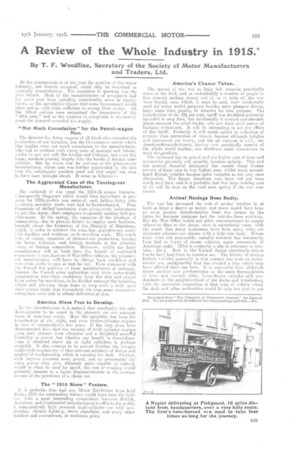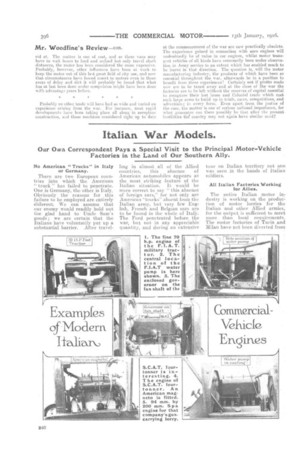A Review of the Whole Industry in 1915.*
Page 11

Page 12

If you've noticed an error in this article please click here to report it so we can fix it.
By T. F. Woodfine, Secretary of the Society of Motor Manufacturars and Traders, Ltd.
At the commencement of the year the position of the motor industry, one branch excepted, could only be described as generally unsatisfactory. The exception in question was the eero branch. Most of the manufacturers of aeroplanes had for years past been spending considerable sinus in experiments, on the speculative chance that some Government would place ordeas with tln sufficient to recoup their outlay. All the Allied nations soon recognized the importance of the " fifth arm," and as the wastage in aeroplanes is necessarily great the demand exceeded the supply.
"Not Much Consolation " For the Petrol-wagon Men.
The demand for Army wagons of all kinds also exceeded the production of our factories, but the Government orders which this implies were not much consolation to the manufacturer, who had to contend with rising costs of material and labour, whilst he saw not only the foreign and Colonial, but even the home, markets passing largely into thehands of foreign competitors. But far worse was the position of the pleasure-car manufacturer, whose case was further aggravated by the fact that his unfortunate position need not and • ought not ever tc have been brOught about-. It arose as follows:— The Aggravated Case of the Touring-car Manufacturer.
'The outbreak of war upset the 1914-15 season business. Consequently theawork which would thea havelbeen in progress for 191St models was reduced, and, failing, being able to obtain inanition work, men had tolbetdischarged. Thus thousands of skilled mechanics were giventevery inducement ti join the Army, their employers frequently making half-pay ellowances. In the spring, the exposure of the shortage of ammunition, due in partsto failure to employ such factories, brought about the formation of the .Ministry of Munitions, which, in order to retrieve the time lost, plaeed?every available machine and workman on to munition work. The result was, of course, cessation of pleasure-ear production, leaving the home, Colonial, and foreign markets at the absolute mercy of foreign competition. Moreover, whilst. the lorry manufacturer will at least have the benefit of continued e?xperiertee in manufacture of War-Office vehicles, the pleasurecar manufacturer with have to change back machines and men from shells to cars as best he can. Even compared with the French the position of these manufacturers is unhappy, because the French army authorities took their motor-trade organization into' their confidence from the first and placed huge orders for munitions, to be divided amongstifhe factories, whilst still allowing those firms to keep 'such a hold upon their proper trade that throughout the year tsorne concessionmitres here were able to obtain deliveries of cars.
America Alone Free to Develop.
In the circumstances it is natural that. practically the only developments to be noted in the pleasure car are amongst those of American origin. Here the speciality has been the introduction of six eight, and even twelve-cylinder engines in cars of comparatively low price. It has long since been demonstrated here that the running of multi-cylinder engines gives both absence from vibration and a delightful senscrof flexibility in power, but whether ally benefit in thescl directions is obtained above six or eight cylinders is perhaps doubtful. It also remains to he proved whether the cheaper multheyele engines are of that extreme accuracy of design and quality if workmanship which is essential for such. Further, such engines consume more petrol, and as presumably the extra power they give, although quite capable of control, would in effect be used for speed, the cost of running would probably amount to a figure disproportionate to the average income of the purchaser of a cheap car.
The "1915 Show" Feature.
It is probable that had any Motor Exhibition been held daring 1915 the outstanding feature would have been the light car, with a. most interesting competition between British, American, and Continental manufacturers to offer to the public a comparatively high powered multi-cylinder car with selfstarting, electric lighting, shock absorbers, and every other comfort and convenience, at moderate price. America's Chance Taken.
The spread of the war to Italy left America practically alone in the field, and as undoubtedly a number of people in this country making money out of, or in spite of, the war were buying ears, which, it must be said, were incidentally used fur many useful purposes besides mere pleasure drives, large SUMS were passing to America for that purpose. The introduction of the 33Aper cent, tariff was donbtless primarily intended to stop that, but incidentally it created considerable alarm amongst the retail trades, who saw their chief source of business threatened. It. will be interesting to see the effect of this tariff. Probably it will result rather in collection of revenue than prevention of import, because although freights and insurances are. heavy, and the ad valorem is c.i.f., the Americantimanufacturers, having now practically control of the whole world market, can doubtless make concessions to meet the position.
The increased tax on petrol and the higher cost of -tires and accessories,generally will sensibly. increase upkeep.. This and the general financial stringency has caused many farmer owners of large cars to buy lighter ones, whilst many secondhand British vehicles hecamehquite valuable as the only ones obtainable. The larger American cars have not yet been much used here, and it is probable that few large touring cars at all will be seen on the road next spring if the war continues.
Animal Haulage Does Badly.
The war has increased the cost of animal traction in at least as large, a degree-as motor, and there would have been ass even greater transformation from the former to the latter for business purposes had the vehicles been available. But the War Office would not allow manufacturers to supply otherwise than to the .Army, save in exceptional cases, with the result that many tradesmen have been using what are obviously pleasure-car chassis with a light-van body. Where thesewere itiot procurable, suitable recourse has necessarily teen had to types of steam vehicles, again necessarily of American make. [This is evidently a slip in reference to eke.
tries.—En.] Now in the'Uuited States electrically-driven trucks have long.been in commoa use. The history of storage battery vehicles generally in this country has been an unfortunate one, and, pos.sibly that has created a bias which may have affected their use here. It is noticeable that, although motor traction row predominates on the main thoroughfares of town and country alike, horse-drawn vehicles still predominate in the. neighbourhood of the docks and warehouses, with the inevitable congestion of that type of vehicle which the dock and other authorities would be only too glad to get rid ot. The matter is one of cost, and as these vans may have to wait hours to load and unload but only travel short distances, the motor has been considered the more expensive. Probably, however, other influences have been at work to keep the motor out of this last great field of city use, and now that circumstances have forced resort to motors even in those areas of delay and dirt it will probably be found that what has at last been done under compulsion might have been done with advantaga years before, Probably no other trade will have had so wide and varied an experience arising from the war. For instance, most rapid developments have been taking place all along in aeroplane construction, and these machines considered right up to date at the commencement of the war aro new practically obsolete. The experience gained in connection with aero engines will undoubtedly he of value in car engines, whilst motor transport vehicles of all kinds have necessarily been under observation in Army service to an extent which has enabled much to be learnt in that direction. The question is, will the motor manufacturing industry, the products of which have been so essential thronghout the war, afterwards be in a position to benefit from these experiences? Certainly not, if profits made now are to he taxed away and at the close of the war the factories are to be left without the reserves of capital essential to recapture their lost home and Colonial trade which cost such large sums to build up in trials, races, competitions, and advertisimf iu every form. Even apart from the justice of the case, the matter is one of serious national importance, for what guarantee can there possibly be that after the present
hostilities country may not again have similar need?




















